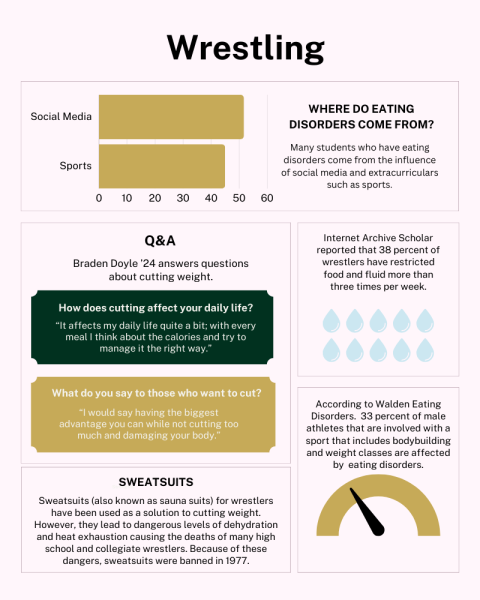Trigger warning: This article contains content about weight loss and unhealthy eating habits.
To compete at a high level of wrestling, one may feel required to cut weight to decrease their body fat, giving them a higher chance of winning. Theoretically, the lower the body fat, the stronger the wrestler is in relation to their competitors. However, rapidly losing weight is often unhealthy and can cause injuries.
The practice of “cutting,” or losing weight (typically quickly), has long been present in wrestling, whether it be high school, college, or professional. In the 1900s, wrestlers wore rubber sauna suits, helping them sweat off water, therefore losing weight. However, in 1977 rubber suits were banned due to the danger of using them. In 1997, after several collegiate wrestlers died while trying to lose weight, more rules were put in place to prevent injuries and death.
For example, wrestlers cannot go below a certain body fat percentage and must lose weight over the course of a prescribed time. According to senior Braden Doyle, at the beginning of the season, wrestlers take a body fat percentage test to determine how much weight they can lose. If they want to move down a weight class, they are limited to how much weight they can lose per week.
“You’re only allowed to lose two pounds of body fat per week as the season progresses,” Doyle said.

According to the National Federation of State High School Associations (NFHS), some wrestlers use unhealthy means to cut weight. These include taking laxatives and diuretics, dehydrating themselves and dramatically decreasing their calorie intake. A common practice is to wear lots of clothes while exercising to increase calories burned and water loss.
Eating disorders, particularly bulimia are prevalent in weight-conscious sports like wrestling. Bulimia is when one eats almost uncontrollably (“binging”) and then vomits, uses laxatives or diuretics, fasts or undergoes extreme exercise to rid their body of what they ate (“purging”). According to Stuart Koman, a doctor and leading researcher in eating disorders, 33 percent of these male athletes are affected by eating disorders.
While Doyle doesn’t engage in binging or purging, he notes that cutting weight is a big factor in what he chooses to eat.
“Every meal, I’m thinking about calories and trying to manage it the correct way,” Doyle said.
His strategy focuses on cutting calories throughout the week and then limiting his fluid intake to make weight.
“As the week progresses, you save calories, and you slowly approach the weight that you’re trying to get to,” Doyle said.” And then you try to dehydrate yourself for the least amount of time possible.”
After weigh-ins, he drinks water to replenish lost weight.
“And then you’ll drink a bunch of water after weigh-ins so that way, you’re feeling your best for the match,” Doyle said.
Although making weight is his least favorite part about wrestling, Doyle acknowledges the importance of giving oneself the best chance of winning.
“It’s actually my least favorite part of wrestling, but you have to, it’s a big advantage if you can do it well,” Doyle said.








































